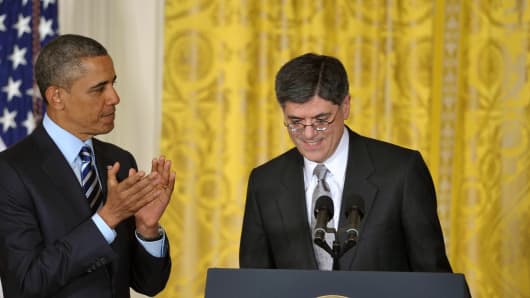U.S. Treasury Secretary Jack Lew warned his partners in the Group of 20 on Wednesday against the perils of "beggar thy neighbor" currency devaluations, picking out China for special mention, while noting that Japan was also on Washington's radar screen.
Speaking on the eve of a meeting here of the G20 developed and emerging economies, Lew also underlined the importance of stronger demand in Europe, keeping up pressure on Germany to loosen policies and provide more support for weaker euro zone members in the bloc's southern region.
"It is imperative that all G20 countries follow through on their recent commitment not to target exchange rates for competitive purposes," he told an audience at Johns Hopkins University's School of Advanced International Studies.
G20 finance ministers and central bankers are expected to confirm a February pledge to avoid competitive devaluations at their gathering here on Thursday and Friday on the sidelines of the spring meetings of the International Monetary Fund and World Bank.
Since the G20's February commitment, the Bank of Japan has pledged to inject $1.4 trillion into the country's economy over the next two years in an effort to boost inflation to 2 percent and stimulate the economy.
The measure has sharply undercut the value of the yen on foreign exchange markets, pushing it to multi-year lows against the dollar and the euro.
In answer to a question, Lew made clear that the United States was keeping tabs on the BoJ's actions for any signs that it has strayed into currency intervention territory.
"We do need to encourage growth in demand, and it should not be aimed at targeting exchange rates, and we watch closely," he said, echoing the line taken by the U.S. Treasury in its semi-annual currency report on Friday.
"Japan has had problems with domestic demand for some time, and to the extent that they are targeting their policies at encouraging domestic demand with domestic tools, we think that is very much consistent with what we and the other G7 countries agreed to just a few weeks ago in Moscow," Lew said.
He was more direct in his criticism of Beijing, a vital but sometimes uneasy U.S. partner that Washington frequently presses to allow its yuan currency to rise on foreign exchange markets, though it has not labeled China as a currency manipulator.
"We are concerned that in recent months, movement towards more currency flexibility appears to have slowed and the pace of China's intervention in the market has picked up," Lew said.
A large chunk of his comments were aimed at Europe, where weak growth worries Washington, which wants stronger countries like Germany to dial back strict austerity measures and adopt looser policies to encourage domestic demand.
"Some of the stronger countries in northern Europe do have more fiscal space to provide fiscal and monetary policies that would encourage more domestic demand," Lew said.
But he was sharply critical of measures that are capable of only generating weak growth in the stronger nations and actually contribute to shrinking economies in the periphery nations of the 17-member euro zone.
"I think that it is not a sustainable policy for year after year after year, and the sooner they get the balance right ... the sooner they'll start seeing signs of fiscal health."


